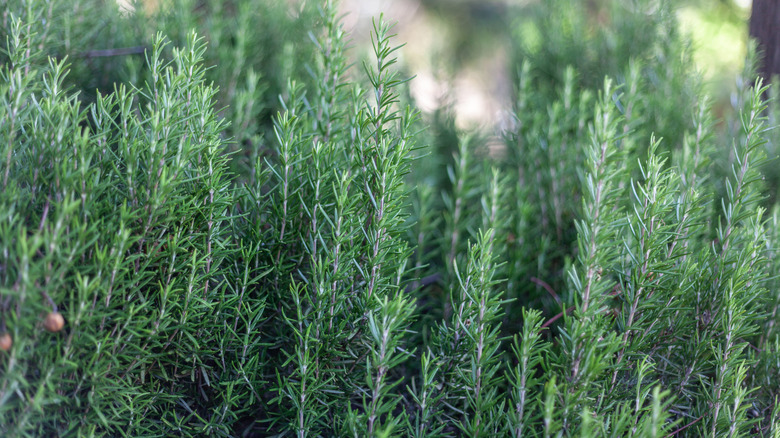The Aromatic Kitchen Herb That'll Help Keep Bugs Out Of Your Garden
The sun-kissed leaves of rosemary don't just bring culinary flair to your kitchen — they're a plant that packs a powerful punch against pests. As the breeze stirs the plant's needle-like foliage, rosemary releases a fragrant aroma that is both soothing to humans and a repellent to a host of garden invaders. This natural defense system can ward off pesky bugs in your garden like ticks and mosquitoes. These insects are deterred by the oils in rosemary's leaves, which disrupt their ability to track prey or locate suitable plants for laying eggs.
Strategically placing rosemary throughout your garden enhances its effectiveness. Potted rosemary thrives in sunny, dry conditions and can easily be moved to areas needing extra protection, such as near outdoor seating or vegetable beds. This herb's resilience also makes it ideal for container gardening, ensuring its pest-fighting properties can extend to patios, windowsills, or anywhere else you want a fragrant barrier. Rosemary even complements companion planting, pairing well with vegetables like carrots and beans to boost overall garden health while keeping bugs at bay.
While rosemary is excellent at deterring insects, it works well alongside other pest-repellent herbs for a layered defense. Lemongrass, lavender, and mint are aromatic allies that can help repel ticks and fleas, while wormwood's bitter scent makes it particularly effective against deer and mice. Incorporating a variety of plants into your garden enhances biodiversity while safeguarding it against a broader range of pests.
Rosemary protects and invigorates
Rosemary doesn't just stop at keeping bugs out of your garden; it also brings an invigorating boost to your environment and well-being. Beyond its role as a pest deterrent, rosemary is prized for its essential oils, which are known to uplift the mood and sharpen mental clarity. This medicinal plant enriches your garden with its fresh, woodsy aroma, providing a serene space for you to relax while working outdoors.
One of rosemary's key strengths is its versatility. Whether planted in rows or scattered across flowerbeds, it creates a fragrant buffer that discourages insects from wandering into your space. The scent that deters ticks, mosquitoes, and carrot flies is equally unpleasant to cabbage moths and aphids, two other common garden pests. For an extra layer of defense, crush a few sprigs of rosemary and scatter them around problem areas, as the released oils intensify the pest-repellent effect. You can also make a simple rosemary spray by steeping its leaves in boiling water, letting it cool, and applying it to plants or outdoor surfaces where pests tend to gather.
For those who enjoy incorporating rosemary into their garden routine, the possibilities are endless. You can dry its leaves for culinary use, extract its essential oils for aromatherapy, or simply crush a sprig and breathe deeply for a moment of mental rejuvenation. Whether you're planting rosemary to protect your prized tomatoes or to enjoy its uplifting aroma, this multitasking herb ensures your garden remains a sanctuary.

